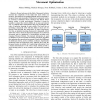1047 search results - page 56 / 210 » Learning the required number of agents for complex tasks |
NN
2007
Springer
13 years 7 months ago
2007
Springer
Reinforcement learning is based on exploration of the environment and receiving reward that indicates which actions taken by the agent are good and which ones are bad. In many app...
AGENTS
1997
Springer
13 years 12 months ago
1997
Springer
We take the position that autonomous agents, when they interact with people, should be governed by the same principles that underlie human collaboration. These principles come fro...
NIPS
1997
13 years 9 months ago
1997
There is strong evidence that face processing is localized in the brain. The double dissociation between prosopagnosia, a face recognition deficit occurring after brain damage, a...
ML
2006
ACM
13 years 7 months ago
2006
ACM
It is well known that many hard tasks considered in machine learning and data mining can be solved in a rather simple and robust way with an instanceand distance-based approach. In...
ICRA
2009
IEEE
14 years 2 months ago
2009
IEEE
— Recent advances in the field of humanoid robotics increase the complexity of the tasks that such robots can perform. This makes it increasingly difficult and inconvenient to ...


